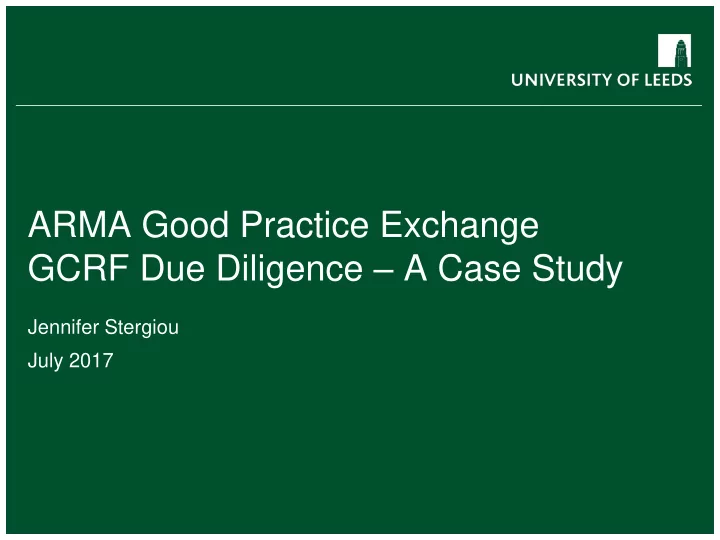

ARMA Good Practice Exchange GCRF Due Diligence – A Case Study Jennifer Stergiou July 2017
Before GCRF…… • Historically risk assessment only undertaken where there was a perceived need • 2014 – The one that got away • Internal audit recommended strengthening risk review process • New risk review process mandated by financial regulations from Aug 2015: ➢ Risk review for all applications and awards ➢ Light touch process for low risk funders – the “declaration” ➢ Risk scoring & red flag issues (automatic escalation) ➢ Escalation / Approval levels for different types of risks • Mitigating actions
Risk types: Red flag issues: • Financial • Credit check issues • Operational • Previous operational issues • Location • High risk countries • Governance • Conflict of interest • Reputation • Risk to the University’s reputation, as identified by the PI
Credit checks • Date of incorporation • Date accounts last filed (tool calculates whether late/overdue) • Working capital positive or negative • Are accounts audited and if yes is audit opinion qualified? • Recommended credit limit (tool compares to contract value or value to the specific partner)
High risk countries: • High risk of corruption • Lack of robust & transparent accounting practices • Economic sanctions • Money laundering concerns • Financing of terrorist activity • Export control risk
GCRF • Risk review dashboard process as normal, PLUS • The Leeds Due Diligence Questionnaire • Standard text for RCUK Assurance questionnaires setting out UOL approach • Contracting process • Pre and post award finance guidance in development
Leeds questionnaire 1. Legal status of the organisation 2. Corporate governance of the organisation 3. Financial controls 4. Income 5. Research grant management 6. Costs 7. Travel and subsistence 8. Accountings systems 9. Audit 10. Sub contracts, partner organisation, consortium and collaborative agreements 11. Conflict of interest 12. Declaration and authorisation to retain/share responses
Then what? What if responses to questionnaire are not provided before the research starts? What if responses to the questionnaire are not satisfactory?
Pre and post award finance guidance Receipts? Verifying The cost of costs conducting due diligence What kind of evidence is acceptable? Who are we paying? Partner authorisation of costs Advance payments
Recommend
More recommend